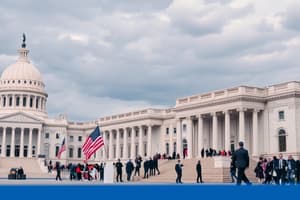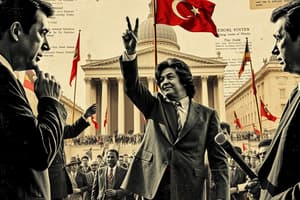Podcast
Questions and Answers
What was the importance of 'iningi' in the struggle for and against the protection of 'minority rights'?
What was the importance of 'iningi' in the struggle for and against the protection of 'minority rights'?
Reinforced
Who does the Zulu language watchdog blame for promoting an incorrect translation or interpretation of democracy into isiZulu?
Who does the Zulu language watchdog blame for promoting an incorrect translation or interpretation of democracy into isiZulu?
Political and societal leaders
How was democracy commonly understood by the interview participants in discussions related to protest or the meaning in isiZulu?
How was democracy commonly understood by the interview participants in discussions related to protest or the meaning in isiZulu?
As freedom
What did Karlström find the words used to mean democracy most closely translated as in Uganda?
What did Karlström find the words used to mean democracy most closely translated as in Uganda?
In what context is the centrality of freedom to popular understandings of democracy argued to be unique?
In what context is the centrality of freedom to popular understandings of democracy argued to be unique?
Why is the notion of democracy as 'freedom' contentious in the history of South Africa?
Why is the notion of democracy as 'freedom' contentious in the history of South Africa?
What is the focus of the article discussed in the text?
What is the focus of the article discussed in the text?
Where are popular understandings and expectations of democracy rooted?
Where are popular understandings and expectations of democracy rooted?
What tensions are highlighted in the article regarding democracy?
What tensions are highlighted in the article regarding democracy?
How does the article contribute to democratic theory?
How does the article contribute to democratic theory?
Who is the corresponding author of the article?
Who is the corresponding author of the article?
Where is the Political and International Studies Programme mentioned in the text located?
Where is the Political and International Studies Programme mentioned in the text located?
What does Ngwane argue that amakomiti represent?
What does Ngwane argue that amakomiti represent?
What are some of the functions of amakomiti mentioned in the text?
What are some of the functions of amakomiti mentioned in the text?
How do amakomiti tend to make decisions?
How do amakomiti tend to make decisions?
What is an accepted practice in amakomiti alongside consensus-seeking?
What is an accepted practice in amakomiti alongside consensus-seeking?
What is the danger associated with consensus as discussed in the text?
What is the danger associated with consensus as discussed in the text?
What is important to recognize about the power dynamics within amakomiti?
What is important to recognize about the power dynamics within amakomiti?
How does Baba Sibiya view democracy?
How does Baba Sibiya view democracy?
What does it mean when all the people in one area decide to live a certain way according to the text?
What does it mean when all the people in one area decide to live a certain way according to the text?
What is the role of the majority in collective decision making according to the text?
What is the role of the majority in collective decision making according to the text?
How does Baba Sibiya describe taking a well-thought-out decision?
How does Baba Sibiya describe taking a well-thought-out decision?
What is a key idea underlying the practice of collective decision making?
What is a key idea underlying the practice of collective decision making?
What is at the core of community grievances, as mentioned in the text?
What is at the core of community grievances, as mentioned in the text?
What does Miraftab argue formal citizenship brings?
What does Miraftab argue formal citizenship brings?
According to Sandercock, what motivates contemporary practices of insurgent citizenship?
According to Sandercock, what motivates contemporary practices of insurgent citizenship?
Why did Claude Ake argue that ordinary citizens in Africa do not separate political democracy from economic democracy?
Why did Claude Ake argue that ordinary citizens in Africa do not separate political democracy from economic democracy?
How do the Zulu respondents characterize democracy?
How do the Zulu respondents characterize democracy?
What is an important indicator of the state and quality of democracy, aside from the institutional sphere?
What is an important indicator of the state and quality of democracy, aside from the institutional sphere?
In South Africa, what has become a visible component of civil society activism for some of the electorate?
In South Africa, what has become a visible component of civil society activism for some of the electorate?
Flashcards are hidden until you start studying
Study Notes
Concept of Democracy in South Africa
- In South Africa, the concept of democracy is closely related to freedom, collective decision making, and socioeconomic freedoms.
- The understanding of democracy is influenced by the country's history of colonial settlement and majority dispossession.
Democracy as Freedom
- Democracy is understood as a practice of freedom, not only in civil and political rights but also in socioeconomic freedoms.
- This concept of freedom is not unique to South Africa, but the context is.
Amakomiti and Local Democracy
- Amakomiti are community-based organizations that provide a space for democracy to be practiced and given meaning.
- They respond to everyday challenges in informal settlements and make decisions through collective decision making and consensus.
- Amakomiti reflect power dynamics, and leaders often have wide scope to make decisions on behalf of the community.
Institutional and Conceptual Democracy
- The gap between formal and substantive inclusion motivates the practices of insurgent citizenship.
- Citizens' forums and interactions with the state are important indicators of the state and quality of democracy.
Popular Understandings of Democracy
- Ordinary citizens in Africa do not separate political democracy from economic democracy.
- Democracy is seen as a collective way of life, and the will of the majority emerges in the context of collective decision making.
- The understanding of democracy is rooted in traditions of popular organization that emerged in the struggle against apartheid.
Tensions between Grassroots and ANC Visions of Democracy
- There are tensions between grassroots understandings and visions of democracy and those articulated by the governing African National Congress (ANC).
- The article highlights the need to re-imagine normative democratic thought based on ideas of democracy from below.
Studying That Suits You
Use AI to generate personalized quizzes and flashcards to suit your learning preferences.




